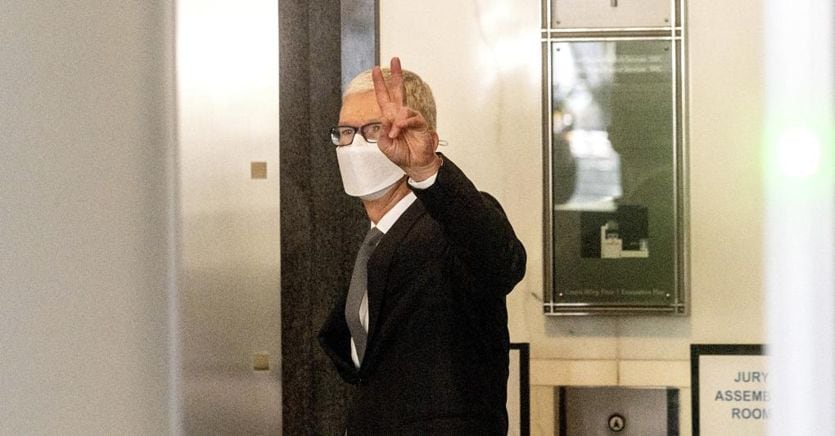Four long and very uncomfortable hours at the bar. Tim Cook, Apple’s chief executive, testified in the antitrust trial filed by the video game leader Epic Games against the Cupertino giant, accused of abuse of dominant position. The banning of competing app stores on the iPhone and the hefty commissions of up to 30% it imposes on transactions within its online store for applications are blamed. And for a top executive known for his phlegm and impassiveness, these were some of the hardest hours of his career: he was hit with a barrage of questions and criticism. Not only of the opposing lawyers but of the judge himself, Yvonne Gonzalez Rogers, who will then have to issue the verdict, in a trial that was agreed without a jury. In some of the clearest jokes, the magistrate remarked on Apple’s extraordinary receipts from developers and openly questioned the thesis that the company is adequately open to competition.
Three weeks of trial
The trial moved by the lawsuit brought by the producer of the popular game Fortnite has started to end after three weeks with an appointment worthy of the stakes, nothing less than a test bed for attempts to downsize the biggest of Big Tech. And observers warn that it is difficult to predict what the Court’s decision will really be, urging not to consider the pressing attitude – often typical of magistrates – as a preview of a sentence. But the San Francisco judge’s lashes were unusual in Silicon Valley, where tech gurus are much more accustomed to friendly tones than to veneration. Not only that: the magistrate has also already asked companies to include, in their upcoming final documents to be filed, proposals for remedies and asserted that the lack of competition in the App Store worries her.
Loading…
Cook’s uncomfortable position
For Cook – and Apple – the position was undoubtedly uncomfortable. The CEO has tried from the beginning to respond to suspicions of managing a real monopoly. He said Apple’s insistence on keeping other app stores and digital payment platforms out was solely a result of its concern for the safety and privacy of consumers and iPhone and iPad users. He denied being motivated above all by profit, stating indeed that “we don’t think about money at all, only the user.” However, once again, he refused transparency on the performance of the App Store, even though Apple considered a economic miracle: he recognized that it is profitable but attributed the conclusion to his “feeling”, to his sensation, avoiding numbers. According to some estimates, the store would have generated revenues of over 70 billion for the company last year.
The judge on the attack
And it was the magistrate himself who went on the attack on Cook’s self-defense: Judge Rogers dryly noted that game developers seem to generate a disproportionate amount of revenue for Apple when compared to the technology Apple offers. He pointed out that Apple’s in-app payment system does not allow competitors, prohibits developers from even warning their users of options for cheaper purchases outside of Apple’s system. “I understand this notion that Apple somehow brings consumers to gamers, to users, but after that first time, that first interaction, the developers are holding back consumers while Apple just pocketing profits from them,” the judge urged.
“Do you believe in competition?”
On the problem of competition, the magistrate asked Cook if he does not believe “in the basic concept that competition is good” and went on to say that “there is no competition for in-app purchases”. An explicit reference to the obligation that Apple imposes on developers to use its payment management service on the iPhone and pay commissions up to 30% in Cupertino. The judge also shed a cold light on Apple’s decision to cut fees to 15% for developers with revenues under a million dollars a year, which the company initially attributed to aid to the crisis from Covid which became permanent. “From what I’ve seen so far, it certainly wasn’t the result of any competition. It was the result of the pressure you felt coming from inquiries and complaints, not from the competition ».
